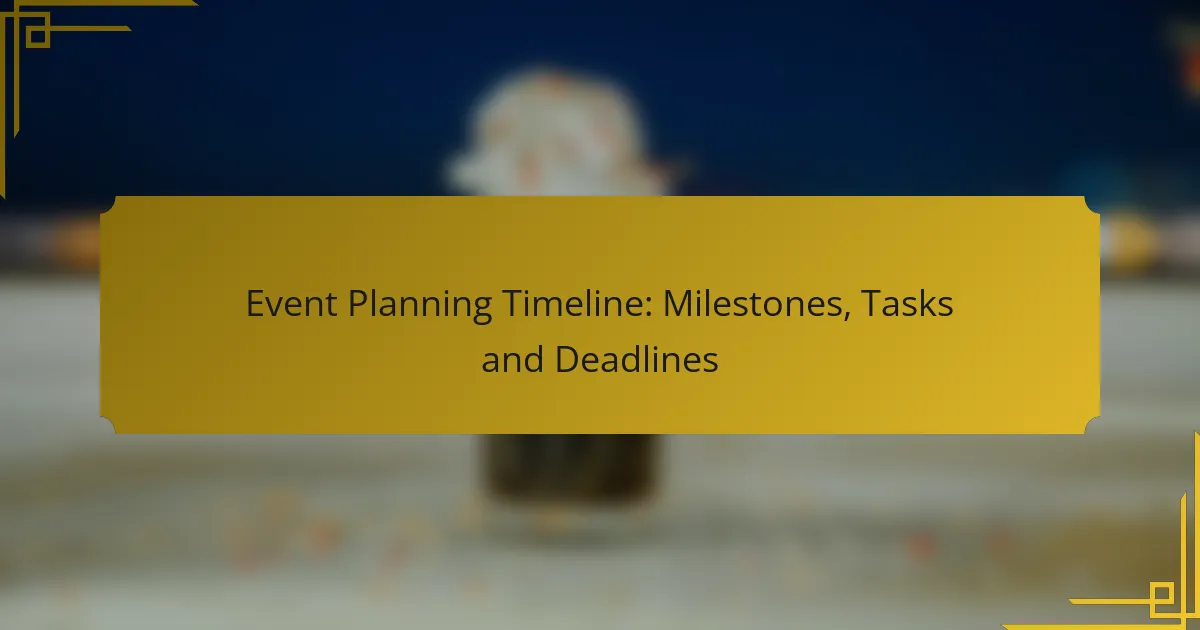Effective event planning requires a clear timeline that outlines key milestones, essential tasks, and critical deadlines. By following these structured stages, planners can ensure that every aspect of the event is addressed, from initial concept to final execution. This organized approach minimizes last-minute stress and enhances the overall success of the event.
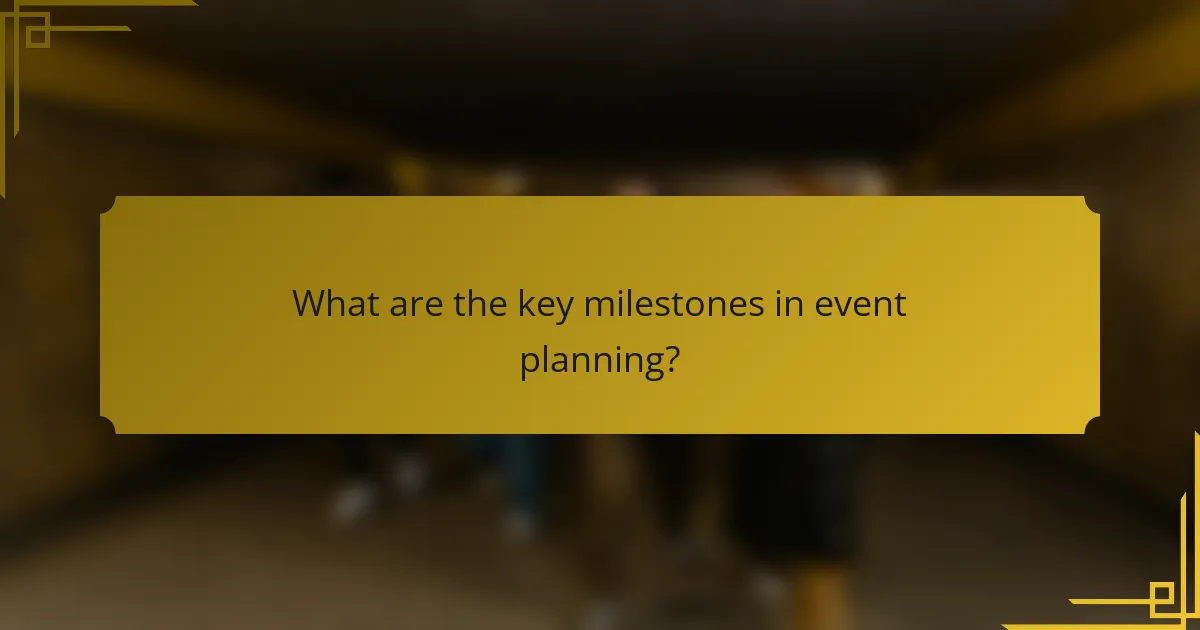
What are the key milestones in event planning?
The key milestones in event planning include critical stages that help ensure the event’s success. These milestones guide the planning process, from conceptualization to execution, and help keep the project on track.
Initial concept development
Initial concept development involves brainstorming ideas and defining the event’s purpose, theme, and target audience. This stage sets the foundation for all subsequent planning and decision-making.
Consider factors such as the type of event, desired outcomes, and potential challenges. Engaging stakeholders early can provide valuable insights and help refine the concept.
Budget approval
Budget approval is essential for determining the financial feasibility of the event. This involves estimating costs for venues, vendors, marketing, and other expenses, then obtaining approval from stakeholders or sponsors.
Establish a budget range that includes a contingency fund of around 10-20% for unexpected costs. Regularly review and adjust the budget as planning progresses to avoid overspending.
Venue selection
Venue selection is a crucial milestone that impacts logistics, capacity, and overall experience. Consider factors such as location, accessibility, amenities, and availability when choosing a venue.
Visit potential venues to assess their suitability and gather quotes. It’s advisable to book the venue at least several months in advance, especially for popular locations.
Vendor contracts
Vendor contracts formalize agreements with service providers such as caterers, decorators, and audio-visual teams. Clear contracts outline services, costs, and timelines, protecting both parties and ensuring accountability.
Negotiate terms carefully, and ensure that cancellation policies and payment schedules are clearly defined. Aim to secure contracts at least a few months before the event to allow for any necessary adjustments.
Final walkthrough
The final walkthrough is the last step before the event, allowing planners to review logistics and ensure everything is in place. This includes checking the venue layout, vendor setups, and technical requirements.
Conduct the walkthrough with key team members and vendors to address any last-minute issues. This step is critical for confirming that the event will run smoothly and meet expectations on the day of the event.
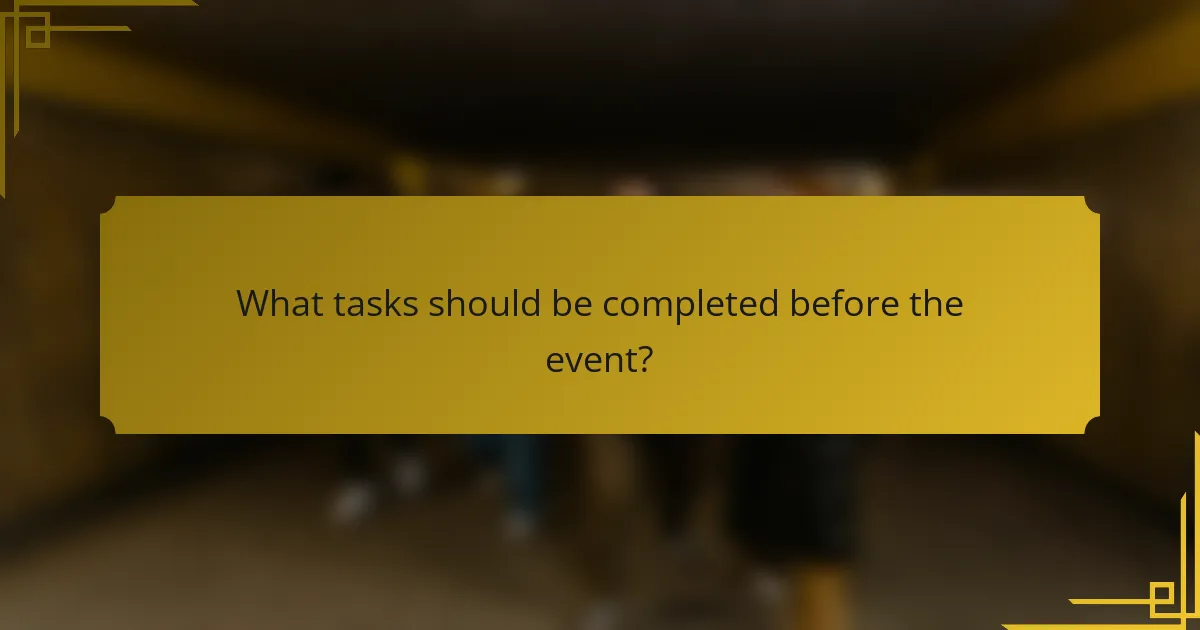
What tasks should be completed before the event?
Before an event, several key tasks must be completed to ensure its success. These tasks include creating a guest list, distributing invitations, planning logistics, and implementing marketing strategies.
Guest list creation
The guest list is a foundational element of event planning. Start by identifying key attendees based on the event’s purpose, whether it’s a corporate meeting, wedding, or community gathering.
Consider factors such as venue capacity and budget constraints when finalizing the list. Aim for a manageable number of guests to ensure a comfortable experience for everyone.
Invitations distribution
Once the guest list is established, the next step is to distribute invitations. Choose a method that suits your audience, such as digital invites for a tech-savvy crowd or printed invitations for formal events.
Send invitations well in advance, typically 4-6 weeks before the event, to allow guests ample time to RSVP. Include essential details like date, time, location, and any special instructions.
Logistics planning
Logistics planning involves organizing all the practical aspects of the event. This includes securing the venue, arranging catering, and coordinating transportation if necessary.
Develop a timeline for setup and breakdown, and ensure that all vendors are aligned with your schedule. Consider creating a checklist to track tasks and deadlines, which can help avoid last-minute issues.
Marketing and promotion
Effective marketing and promotion are crucial for maximizing attendance and engagement. Utilize various channels such as social media, email newsletters, and local community boards to reach your audience.
Consider creating promotional materials like flyers or online ads to generate interest. Set a timeline for your marketing efforts, starting several weeks before the event to build momentum.
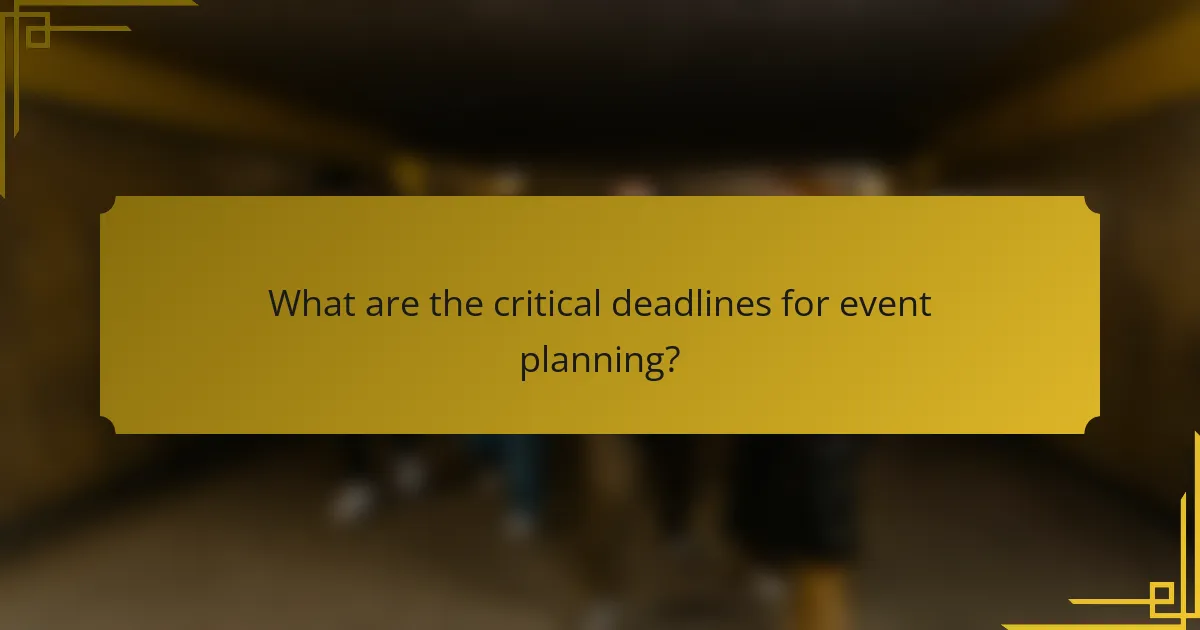
What are the critical deadlines for event planning?
Critical deadlines in event planning are essential timeframes that ensure all tasks are completed efficiently. These milestones help keep the planning process organized and on track, minimizing last-minute stress and ensuring a successful event.
Six months prior
At the six-month mark, it’s crucial to establish the event’s overall vision and objectives. Begin by securing the venue and confirming the date, as popular locations can book up quickly. This is also the time to create a preliminary budget, considering venue costs, catering, and entertainment.
Additionally, start assembling a planning team or committee. Assign roles based on strengths and expertise to ensure all aspects of the event are covered. Early communication with vendors can also help lock in services and negotiate better rates.
Three months prior
Three months before the event, focus on finalizing details. Confirm the guest list and send out save-the-date notifications. This is also the time to finalize contracts with vendors, including catering, audio/visual equipment, and decorations.
Consider creating a detailed timeline that outlines each task leading up to the event. This will help keep everyone accountable and ensure that nothing is overlooked as the date approaches.
One month prior
One month out, it’s time to shift into high gear. Confirm RSVPs and finalize seating arrangements. Review all vendor contracts to ensure services are as expected and make any necessary adjustments.
It’s also wise to conduct a final walkthrough of the venue with key team members. This helps identify any potential issues and allows for last-minute changes to be made smoothly.
One week prior
In the final week, focus on logistics and communication. Reconfirm all arrangements with vendors and ensure everyone knows their responsibilities for the event day. Prepare any materials or signage needed for the event.
Consider creating a checklist for the day of the event, outlining key tasks and timelines. This will help ensure that everything runs smoothly and that the event meets its objectives.
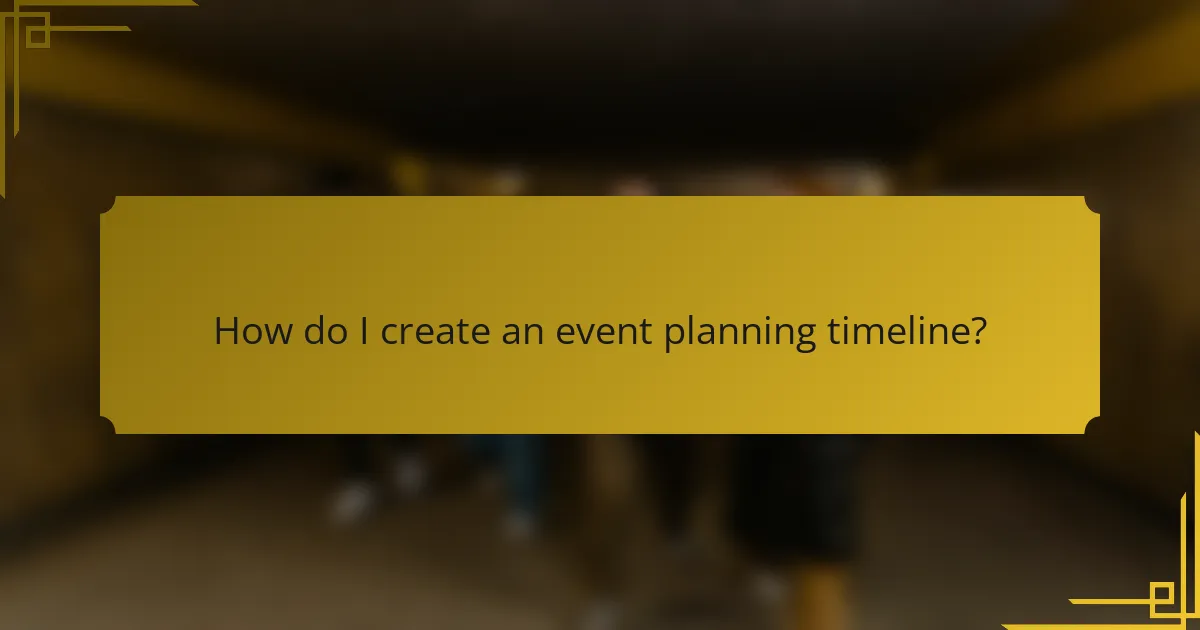
How do I create an event planning timeline?
Creating an event planning timeline involves outlining key dates, tasks, and milestones to ensure a smooth execution. A well-structured timeline helps you stay organized and on track, minimizing last-minute stress.
Define the event date
The first step in creating your event planning timeline is to define the event date. This date will serve as the anchor for all other tasks and deadlines. Consider factors like venue availability, guest schedules, and seasonal considerations when selecting the date.
Once the date is set, communicate it clearly to all stakeholders involved. This ensures everyone is aligned and can plan accordingly, avoiding conflicts and misunderstandings.
List all tasks and milestones
Next, compile a comprehensive list of all tasks and milestones required for the event. This can include venue booking, catering arrangements, invitations, and logistics. Break down larger tasks into smaller, manageable steps to make tracking easier.
Utilize brainstorming sessions or checklists to ensure you capture every necessary detail. Prioritize tasks based on their importance and deadlines, which will help you focus on what needs to be accomplished first.
Assign deadlines to each task
Once you have your list of tasks, assign specific deadlines to each one. This creates a sense of urgency and helps you monitor progress effectively. Be realistic with your deadlines, allowing for potential delays or unforeseen issues.
Consider using a Gantt chart or a simple calendar to visualize deadlines. This can help you identify overlapping tasks and adjust your timeline as needed to keep everything on track.
Use project management tools
Employing project management tools can significantly enhance your event planning timeline. Tools like Trello, Asana, or Microsoft Project allow you to organize tasks, set deadlines, and track progress in real-time. They also facilitate collaboration among team members.
Choose a tool that fits your team’s size and complexity of the event. Many of these tools offer templates specifically designed for event planning, which can save time and streamline the process.
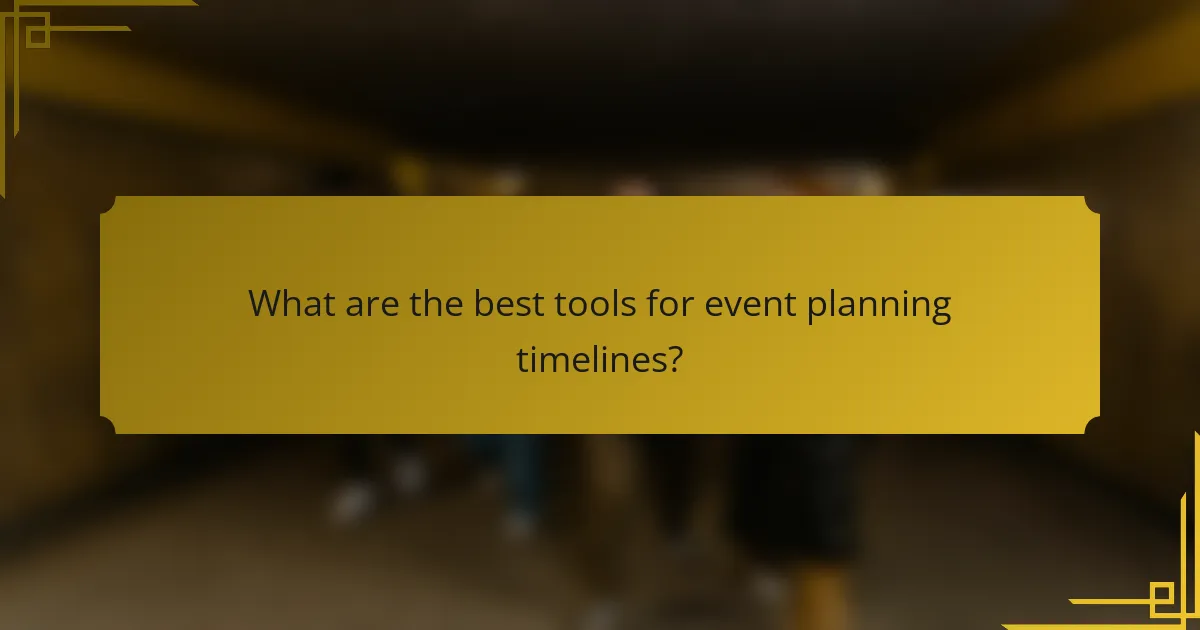
What are the best tools for event planning timelines?
Effective event planning timelines can be streamlined using tools that enhance organization and collaboration. Popular options include Trello and Asana, each offering unique features tailored to different aspects of event management.
Trello for task management
Trello is a visual task management tool that uses boards, lists, and cards to organize tasks. This setup allows event planners to easily track progress and assign responsibilities, making it ideal for managing timelines and deadlines.
To maximize Trello’s effectiveness, create a board specifically for your event, with lists for different phases such as planning, execution, and follow-up. Each card can represent a task, which can be assigned to team members with due dates, checklists, and attachments for relevant documents.
Asana for team collaboration
Asana is designed for team collaboration, providing a platform where members can communicate and coordinate tasks seamlessly. It offers features like project timelines, task assignments, and progress tracking, which are essential for keeping everyone aligned during the event planning process.
Utilize Asana’s timeline view to visualize your event’s schedule, allowing you to see overlapping tasks and dependencies. Regularly update task statuses and use comments for discussions to ensure all team members are informed and engaged throughout the planning stages.
